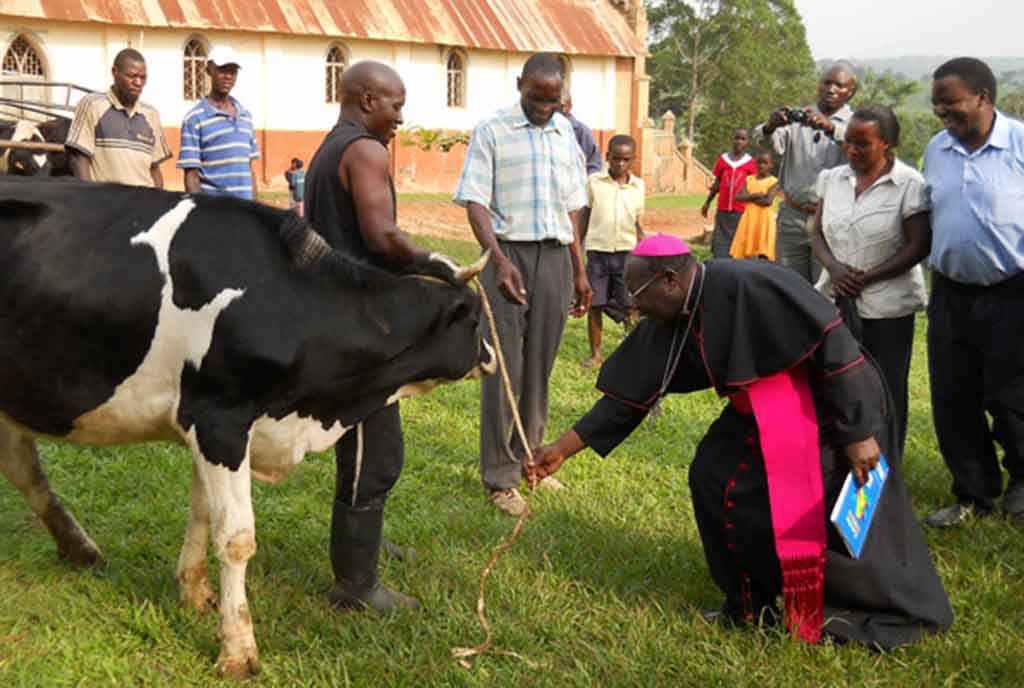By Michael J. Ssali
Last week, 21 farmers in Masaka Diocese got what Fr Peter Ssenkayi, assistant director of Masaka Diocesan Development Organisation (Maddo), called living loans.
Every farmer got an in-calf Friesian and each will be expected to pay back to Maddo a calf, which the organisation will lend to other farmers later. If by bad luck the cow dies before the farmer pays back the promised calf, the loan too will be counted dead and buried together with the cow.
The cows were handed over to the farmers at Villa Maria Cathedral. The cows were some of the 850 that Maddo has so far lent out to farmers with financial assistance from the US based Micro-financing Partners in Africa. It is the ideas in the speeches made on that occasion that form the basis of our discussion today since they were drawn from months of intensive preparation of the farmers for the cows they received.
Fr Ssenkayi called the occasion a graduation ceremony for the farmers. The preparatory training had been going on for over a year during which time, farmers planted fodder grass and trees, made cow shades, and acquired necessary equipment for feeding the cow.
They were also taken through the various achievements they should expect from keeping a Friesian cow, how to use its urine and dung, record keeping, saving money, improving diet, environment protection, the need for gender equity and transparency and total transformation from poverty to prosperity. The crowning event of that training was the provision of the actual cows – which for them was the main certificate to take home.
Have a passion for cattle
The simple acquisition of a cow in a household, however, is not enough to cause real development in that home. The farmer must first of all be interested in keeping a cow, perhaps after visiting fellow farmers and seeing the positive change cattle keeping has caused. “Any preparatory training that we provide, should be built around your personal interest in possessing a cow,” Fr Ssenkayi told the farmers.
Bishop Kaggwa went through various ways cattle keeping is related to other farming activities in a home. Apart from being used as manure, cattle urine can be used as a pesticide as farmers had been taught. By using urine, a farmer saves the money that should have been spent on manufactured pesticides and fertilisers to grow her crops. Cow dung forms good manure for such crops as bananas, coffee, maize, and vegetables. It appeared the bishop was revising with them what they had actually already been taught. The cow has to be owned by everyone in the home and should never be seen as daddy’s or mummy’s cow but rather as “our cow”.
Share responsibility
To achieve this, the bishop said, everyone in the home should be seen to be benefiting by drinking the milk and by being satisfied with the way the money earned from the milk is used. This calls for proper book keeping, record-keeping, and total transparency in the way the money is used.
As cattle keepers, they were asked to be friends and to keep visiting each other to share knowledge and experience. Farmers need not always gain new knowledge from agricultural extension service providers. A fellow farmer may advise you on how to feed your animal better to achieve higher milk yields. You could learn from a fellow farmer how to apply farmyard manure on the crops to improve production. It will be something that you will be seeing for yourself right before you on their farm.
Bishop Kaggwa reminded them that it was possible for them to use cow dung to make bio-gas, which they could use to cook and to light their houses. “This will mean less dependence on wood for fuel and less dependence on paraffin for lighting your homes,” he told them. One binding factor for all of them is that they have a ready market for the milk. Maddo’s truck will always be there to collect the milk from agreed points in the various villages. They had been assured that with proper care each one of the cows they had got, would yield at least 15 litres of milk every day.
“We expect that as a family, you might drink two litres of the milk every day and sell the rest.The cow’s manure will lead to higher crop yields and bigger incomes. So you will be in a position to pay your children’s fees, to build better houses, and to feed better and to live healthier lives.”
ssalimichaelj@gmail.com

